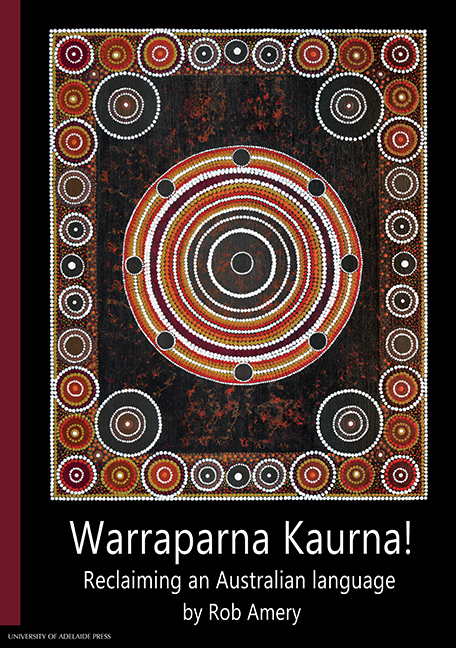Book contents
- Frontmatter
- Contents
- Maps, Plates, Graphs and Tables
- Preface to this Edition (2016)
- Foreword to the 2000 Edition
- Preface to the 2000 Edition
- Acknowledgements
- Abbreviations
- Conventions and Terminology
- Chapter 1 Locating the Study
- Chapter 2 Language Reclamation
- Chapter 3 An Ecological Approach to Language Revival
- Chapter 4 A Sociolinguistic History of Kaurna
- Chapter 5 Kaurna Sources
- Chapter 6 Restoring and Transforming the Kaurna Language
- Chapter 7 Kaurna Language Programs
- Chapter 8 Kaurna in Society
- Chapter 9 Kaurna Language Revival: The Formulaic Method
- Chapter 10 Sociopolitical Dimensions of Kaurna Language Revival
- Chapter 11 Into the Twenty-first Century: Developments since 2000
- Chapter 12 Summary and Conclusions
- Bibliography
- Index
Chapter 10 - Sociopolitical Dimensions of Kaurna Language Revival
Published online by Cambridge University Press: 28 July 2017
- Frontmatter
- Contents
- Maps, Plates, Graphs and Tables
- Preface to this Edition (2016)
- Foreword to the 2000 Edition
- Preface to the 2000 Edition
- Acknowledgements
- Abbreviations
- Conventions and Terminology
- Chapter 1 Locating the Study
- Chapter 2 Language Reclamation
- Chapter 3 An Ecological Approach to Language Revival
- Chapter 4 A Sociolinguistic History of Kaurna
- Chapter 5 Kaurna Sources
- Chapter 6 Restoring and Transforming the Kaurna Language
- Chapter 7 Kaurna Language Programs
- Chapter 8 Kaurna in Society
- Chapter 9 Kaurna Language Revival: The Formulaic Method
- Chapter 10 Sociopolitical Dimensions of Kaurna Language Revival
- Chapter 11 Into the Twenty-first Century: Developments since 2000
- Chapter 12 Summary and Conclusions
- Bibliography
- Index
Summary
Language is power. If we don't have that power base we are continually going tobecome Anglicised.
(Alice Rigney, in Warranna Purruna video, DECS, 1997)[L]anguage reclamation is a part of the Aboriginal decolonisation of Australia.
(Lester Irabinna Rigney, Interview with Jenny Burford, 21 October 1997, adapted by Lester 6 March 1998)Having seen the ways in which the Kaurna language is being used in teaching programs within the Kaurna community, and in the public domain, let us now look at what drives this activity. Why do some people invest so much time and energy in the language movement?
Of course there are multiple and constantly changing reasons, but a number of common themes emerge. Participation in Kaurna programs and use of the Kaurna language is fundamentally an ‘act of identity’ for Kaurna people. Questions of personal and group identity underpin the need to make a public statement to the world about the survival of the Kaurna people. Identity issues underpin the struggle for empowerment and the need to understand Kaurna history and Kaurna culture. These are central concerns for most, if not all, who are actively involved.
For a number of Kaurna people, their engagement with the Kaurna language is intensely personal, with its own inbuilt rewards. As Lewis O'Brien says (Interview, 28 October 1997):
It's all those things you find out, see, it's those extensions you're building on, and that's what I see is so beautiful about this … You get rewarded. See, it's a personal reward … So that you feel better in yourself … You think ‘Gee! That's incredible!’ It's all that sort of mix of things. But that takes a long time and that doesn't matter. That's irrelevant.
For Lewis, study of the Kaurna language is primarily an intellectual pursuit; for him, the language reveals much about the way Kaurna people thought and viewed the world. These conceptual understandings often resonate with Lewis's childhood memories of stories he heard from the old people when he was growing up at Bukkiyana.
Lewis has been poring over the Kaurna sources for many years, even prior to the establishment of Kaurna programs, trying to match up the records compiled by the missionaries with his childhood memories.
- Type
- Chapter
- Information
- Warraparna Kaurna!Reclaiming an Australian language, pp. 250 - 279Publisher: The University of Adelaide PressPrint publication year: 2016

